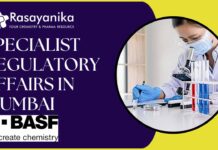Industrial chemistry is a dynamic field that involves the application of chemical principles to develop and manufacture products on a large scale. To succeed in this competitive industry, professionals need to be well-versed in various advanced lab techniques that aid in the analysis and characterization of substances. In this article, we will explore some key lab techniques essential for entry into industrial chemistry, including chromatography, mass spectrometry, spectroscopy, x-ray diffraction, atomic force microscopy, and polymer characterization.
- Chromatography
Chromatography is a powerful separation technique widely used in industrial chemistry to separate and analyze complex mixtures. Gas chromatography (GC) and high-performance liquid chromatography (HPLC) are commonly employed methods. GC is valuable for analyzing volatile compounds, while HPLC is suitable for a broader range of substances. With chromato
graphy, chemists can identify the components of a mixture, quantify their concentrations, and assess purity, ensuring the quality of final products.- Mass Spectrometry
Mass spectrometry is a versatile technique that measures the mass-to-charge ratio of ions. It is invaluable for identifying unknown compounds and determining their molecular structures. In industrial chemistry, mass spectrometry aids in analyzing product formulations, identifying impurities, and assessing the integrity of chemical reactions. The data obtained from mass spectrometry allows chemists to make informed decisions during the production process.
- Spectroscopy
Spectroscopy encompasses various techniques like infrared (IR), ultraviolet-visible (UV-Vis), and nuclear magnetic resonance (NMR) spectroscopy. Each method provides unique insights into the chemical composition and structure of substances. IR spectroscopy is valuable for identifying functional groups, UV-Vis spectroscopy helps determine electronic transitions, and NMR spectroscopy aids in elucidating molecular structures. Spectroscopic techniques are essential tools for industrial chemists to analyze compounds and ensure product quality.
- X-ray Diffraction
X-ray diffraction (XRD) is a non-destructive technique used to determine the crystal structure of solid materials. In industrial chemistry, XRD is utilized to study the arrangement of atoms within compounds and to analyze the purity and crystallinity of materials. XRD findings are crucial in the development and quality control of products like pharmaceuticals, catalysts, and materials used in electronics.
- Atomic Force Microscopy
Atomic force microscopy (AFM) is an advanced imaging technique that allows chemists to visualize surfaces at the nanoscale. In industrial chemistry, AFM is applied to analyze the topography and mechanical properties of materials. It aids in assessing the quality of coatings, thin films, and nanomaterials, and is instrumental in developing innovative products with enhanced properties.
- Polymer Characterization
Polymer characterization techniques are crucial for industrial chemists working with polymers and plastics. Techniques like gel permeation chromatography (GPC) and differential scanning calorimetry (DSC) are used to analyze molecular weight distribution, thermal properties, and other characteristics of polymers. Accurate polymer characterization is vital in tailoring polymer properties for specific applications, such as in packaging, automotive, and medical industries.
Conclusion
In the competitive world of industrial chemistry, proficiency in advanced lab techniques is key to success. Chromatography, mass spectrometry, spectroscopy, x-ray diffraction, atomic force microscopy, and polymer characterization are essential tools that empower chemists to analyze, characterize, and optimize chemical processes and materials.
By mastering these lab techniques, aspiring industrial chemists can gain a competitive edge, opening doors to exciting career opportunities and impactful contributions to the development of innovative products in various industries. Continuous learning and skill development in these techniques will enable professionals to excel in their careers and shape the future of industrial chemistry.
Chemistry Advanced Lab Techniques Looking for latest chemistry and Pharma job openings, follow Rasayanika Facebook and Telegram and subscribe to our youtube channel for the latest updates on chemistry and Pharma jobs and much more

















































